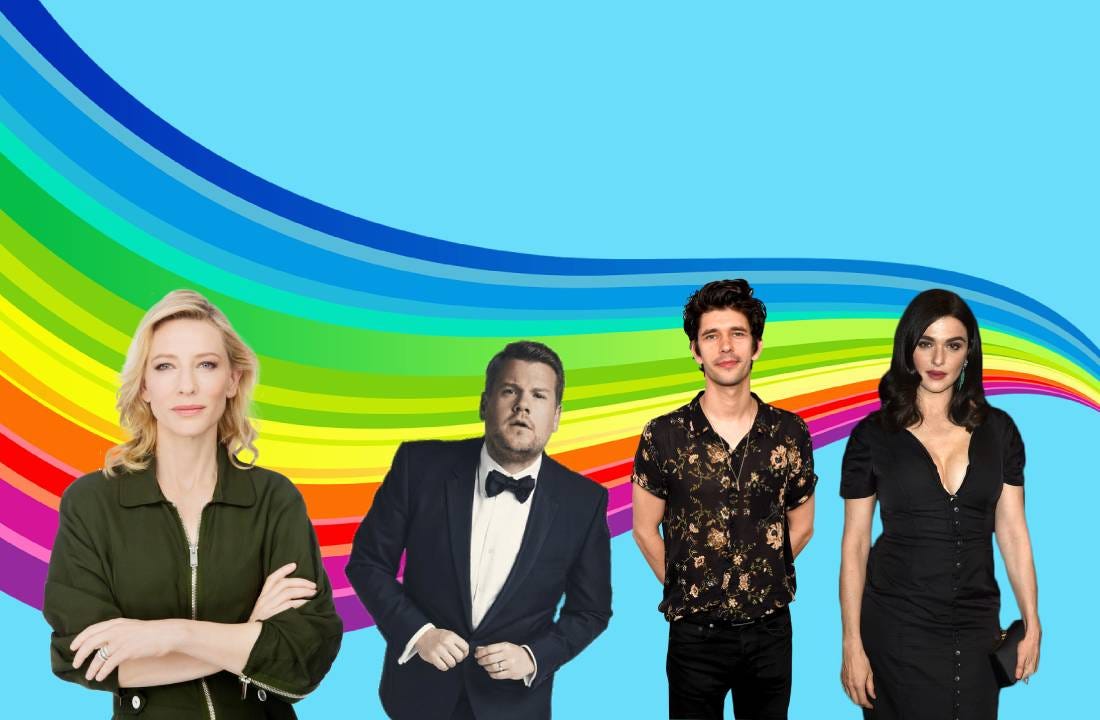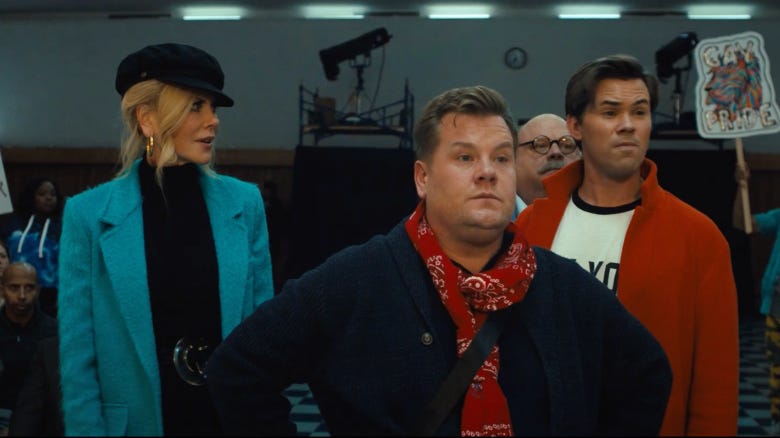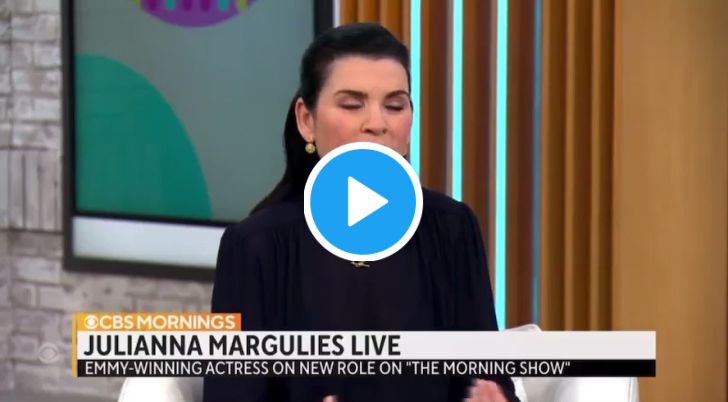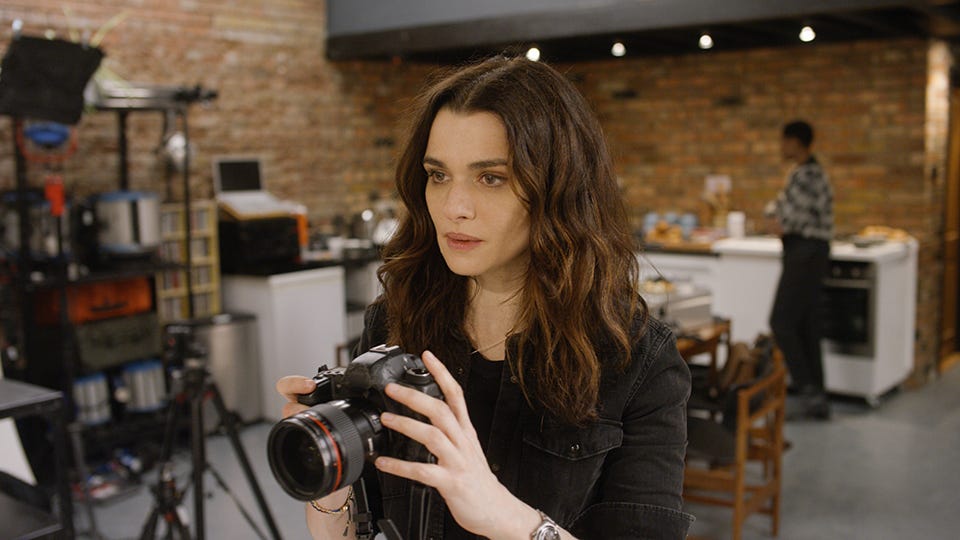Should Straight Actors Play Gay Characters?
This is the Sunday Edition of Paging Dr. Lesbian. If you like this type of thing, subscribe, and share it with your friends! Every so often a pop-cultural debate seems to arise, and the same arguments are rehashed every time. The debate is centered on a deceptively complicated question: should straight actors play gay roles? This question was reignited once again last year with the release of Ryan Murphy’s Netflix musical The Prom, in which James Corden rather flamboyantly plays a gay character. Corden’s performance in the film was widely criticized, and he was accused of performing “gayface” in the role. (It’s important to note here that gayface is a term without a clear definition, and is perhaps somewhat troublingly conflated with the term “blackface,” a practice that has much deeper and more violent connotations). But, the validity of the term aside, Corden’s role in the film brought up a common question that doesn’t really seem to have a clear answer. The logical strength of the arguments supporting the notion that only gay actors should play gay roles vary. One trendy article in Pink News, published in January of this year, provides a list of “13 iconic gay films starring straight actors we want to see remade with loud, proud queer talent”. The logic of this list falls apart when you take a closer look and discover that a number of films on the list do co-star queer actors and are directed by queer directors. Portrait of a Lady on Fire, for example, is directed by a lesbian and has a lesbian star, and God’s Own Country was written and directed by a gay man. I won’t harp too much on this article because I think it’s a particularly illogical way to frame this argument – an argument which the article itself doesn’t even really lay out – but it does illustrate an especially simplistic understanding of the issues at hand, one that I think is too often repeated. Other arguments that take this side of the debate are somewhat better argued, but similarly blurry in their implications. Various actors and directors have weighed in on this debate, which naturally reignites this discourse with every article written. Gay writer and director Rusell T. Davies, known for Queer as Folk and It’s a Sin, has used comparisons to explain his point of view, noting that “You wouldn’t cast someone able-bodied and put them in a wheelchair, you wouldn’t Black someone up. Authenticity is leading us to joyous places.” Similarly, straight actor Richard E. Grant (who played a gay man in Can You Ever Forgive Me?) has asked: “The transgender movement and the #MeToo movement means, how can you justify heterosexual actors playing gay characters?” The problem with these arguments is that they reflect related but distinct casting problems in Hollywood. Whitewashing a character or putting an actor in blackface or yellowface is simply not equivalent to a straight actor playing a gay role. For one thing, these casting practices are rooted in horrifically racist ideas and serve to dehumanize the groups of people being portrayed. Indeed, the history of these traditions are very different. Because of the Hays Code, open displays of homosexuality were prohibited in cinema until the 1970s, which meant that queerness was coded into films, often by gay writers, directors, and stars themselves. As such, queerness has existed in cinema in many different forms over the years, and the success and/or “authenticity” of such content is not so easily defined. On the other hand, blackface, brownface, and yellowface were allowed and even celebrated in Hollywood, which only further denigrated people of color and limited the roles actors of color could play. The other conflation, as put forth by Grant, is made between gay representation and trans representation. Once again, though these ideas are related, they are not equivalent. Cis actors playing trans roles is much more harmful than straight actors playing gay roles (a topic I discussed in last week’s newsletter, as put forth by the documentary Disclosure). Many articles – such as this NBC News article “Should straight actors still play gay characters?” – confuse these two issues, asking one question and answering another one entirely. This argument harms the clarity of both discussions and is another example of how often gender and sexuality are conflated in popular discussions about identity. Similarly, the context of (dis)ability is different from the context of sexual orientation in casting. It’s frequently been argued that able-bodied actors should not play disabled characters, partly because mimicking disabilities can be offensive, and partly because this leaves disabled actors with very few roles to play. Because disabled actors are often unable to play able-bodied characters, as the argument goes, able-bodied actors (who of course can play able-bodied characters), should not take these roles. To be sure, this notion of equity has also been applied to queerness in cinema. It’s long been assumed that gay actors may be pigeonholed or only considered for gay roles after coming out, which is likely the reason there are still a number of closeted actors in Hollywood. (Remember when Kate Winslet inexplicably announced that she knows “at least four” actors in Hollywood who are afraid of coming out?) Nonetheless, a gay actor fearing prejudice is not quite the same as a disabled actor who may not have a choice in whether or not they disclose their disability. This idea has led Darren Criss, a straight actor known for playing several gay roles, to publicly declare he will never play another gay role again in order to open up space for queer actors to play these roles. On the other hand, gay actor Ben Wishaw, known for Paddington and James Bond, among other things, has argued that more gay actors should be given straight roles, which would even the playing field for everyone in the long run. While such arguments are certainly logical, these assumptions have thankfully started to fade away in recent years, with actors such as Kristen Stewart and Matt Bomer having achieved success playing both gay and straight roles. Probably the most compelling argument for straight actors taking a step back from playing gay roles is this fact, told by Alexandra Pollard in The Independent: “since the turn of the century, no fewer than 25 actors have been Oscar nominated for playing LGBT+ roles,” and “not a single one was openly queer.” This fact reflects the idea that, at least historically, straight actors have been critically lauded for playing gay roles, while gay actors have not received the same acclaim. While gay characters have become more common and thus straight actors are less likely to be called “brave” for playing these roles than they might have in the past, there is certainly still a disparity present here. These statistics also reflect the type of gay films that are accepted by Hollywood, films such as A Single Man or Brokeback Mountain, which are deeply tragic or sad and typically make good Oscar fodder. Indeed, this reflects a broader trend in Hollywood production more broadly, rather than simply an issue of casting. In a similar vein, the notion of authenticity is frequently brought up within these discussions of gay characters. Some – such as Davies – argue that a queer actor is more likely to be able to play a queer role from a place of authenticity, and should be cast for this reason. It is certainly true that there are some straight actors who don’t do a particularly believable job of playing gay characters (while Corden in The Prom is an obvious example, there are other less egregious examples I could name), but this can be boiled down to these actors simply not having the range, as they say. To put it simply, any good actor should be able to portray a character’s experience even if it differs extensively from their own. A number of ostensibly straight actors – Cate Blanchett and Rachel Weisz, for example – have argued for their rights to play gay roles, or, as Blanchett puts it, “the right to suspend disbelief and play roles beyond my experience." Nonetheless, gay actors are often able to bring something to a part that straight actors might not, ie. this very idea of experience. Moreover, a gay or queer actor might have a more personal understanding of the cultural significance of the role, which might lead them to tackle it in a uniquely nuanced way. But, what is often omitted from this discussion of authenticity is the bigger picture of how a film or a television series is brought together. The writing and directing of a film are just as important as the acting, but these things are often overlooked in favor of focusing on the pretty faces that portray these stories and on celebrity culture in general. The feeling of authenticity can be achieved in a number of different ways. For example, the critically acclaimed film Moonlight was directed by a straight man and featured a straight actor, but the screenplay was written by gay writer Tarell Alvin McCraney. Director Barry Jenkins was able to make the story look and feel authentic because of McCraney’s excellent script, as well as his own experience growing up in the same community as these characters. Similarly, God’s Own Country – which stars two straight actors – is a successful film because it is imbued with writer and director Francis Lee’s own experience of growing up gay in a rural farming community. Similar dynamics occur in television. I’ve often found that I can almost always tell when a queer storyline or character on TV was written by a queer writer. For example, Alex’s coming-out storyline on Supergirl or Elena’s on One Day a Time both transmitted this feeling of authenticity, a feeling that was deeply felt and appreciated by the show’s queer fans (Indeed, my spidey senses were right – both shows had queer writers in the writer’s room). While good acting is also necessary to bring these stories to life – and both these examples have that – the heart of these stories began long before the actors walked on screen. According to writer and director Desiree Akhavan, the most important aspect of queer stories is that there are queer people leading the way or working behind the scenes. Akhavan briefly received some flack for casting Chloë Grace Moretz as the lead in her adaptation of The Miseducation of Cameron Post, because viewers assumed Moretz was a straight actor playing a gay role. Akhavan defended this casting for the reasons outlined above. After the movie came out – and also after Moretz was asked point-blank how she identified, a question which she understandably found uncomfortable – Moretz was photographed kissing model Kate Harrison, proving these criticisms wrong once again. This examination of Moretz is illustrative of the cultural obsession we have with celebrities’ lives. This makes these conversations increasingly complicated, and, indeed, troubling. This casting question seems to in part stem from the increased access we have to actors’ personal lives, and moreover, the idea that audiences deserve to know more about the celebrities they follow. This has also led to an increasingly common practice – such as happened with Moretz – of interviewers putting actors on the spot and asking them to explicitly define their sexual orientation. Thus, another issue with the demand that only gay or queer actors play gay roles is that it forces such actors to be out in order to take these roles or else risk facing public scrutiny. While the intentions behind this demand are fair enough, what doesn’t seem fair is asking actors to declare their sexuality in conjunction with a character they play. As Chris Mandle puts it in GQ, this “increasingly feels like the wrong question to ask; a should invites either a yes or a no response. But we are never going to reach a collective decision, because such a decision would be impossible to make.” The black-and-white world that this question constructs is simply not realistic, nor does it encapsulate the many elements that make a film or a character believable or authentic. There are certainly many examples of poorly produced gay content or actors being dismissive about how someone’s experience as a gay person might affect their life differently. Rachel Weisz once implicitly compared playing an alcoholic character to playing a gay character, which understandably angered some readers. (To be fair, she did not quite say that being gay is the same as being an alcoholic, though it’s not a great equivalence either way). But, as Mandle puts it, “Asking a bad question will always result in a bad answer.” Certainly, the notion of encouraging equitable casting practices is important, and gay actors should be able to play whichever roles they feel comfortable playing. It would undoubtedly be beneficial were there an increased effort to include queer actors in queer productions and consider them for queer roles. But conflating these conversations about equity and authenticity with other deeply entrenched casting issues – particularly in regards to race, gender, and ability – does a disservice to the complexity of these questions. Indeed, such debates will not be settled overnight, nor should they be. Authenticity can come in many forms, and it does not necessarily originate with the beautiful people whose faces are blown up on our screens. If you liked this post from Paging Dr. Lesbian, why not share it? |
Older messages
Representation Won’t Save Us, But It Can Hurt Pretty Bad
Thursday, November 4, 2021
On Netflix, Hope, and False Promises
dispatch from gay christmas
Thursday, November 4, 2021
and something about judith butler dunking on the terfs (again)
You Might Also Like
*This* Is How To Wear Skinny Jeans Like A Fashion Girl In 2025
Wednesday, March 12, 2025
The revival is here. The Zoe Report Daily The Zoe Report 3.11.2025 This Is How To Wear Skinny Jeans Like A Fashion Girl In 2025 (Style) This Is How To Wear Skinny Jeans Like A Fashion Girl In 2025 The
The Best Thing: March 11, 2025
Tuesday, March 11, 2025
The Best Thing is our weekly discussion thread where we share the one thing that we read, listened to, watched, did, or otherwise enjoyed recent… ͏ ͏ ͏ ͏ ͏ ͏ ͏ ͏ ͏ ͏ ͏ ͏ ͏ ͏ ͏ ͏ ͏ ͏ ͏ ͏ ͏ ͏ ͏ ͏ ͏ ͏ ͏ ͏
The Most Groundbreaking Beauty Products Of 2025 Are...
Tuesday, March 11, 2025
Brands are prioritizing innovation more than ever. The Zoe Report Beauty The Zoe Report 3.11.2025 (Beauty) The 2025 TZR Beauty Groundbreakers Awards (Your New Holy Grail Or Two) The 2025 TZR Beauty
Change Up #Legday With One of These Squat Variations
Tuesday, March 11, 2025
View in Browser Men's Health SHOP MVP EXCLUSIVES SUBSCRIBE Change Up #Legday With One of These Squat Variations Change Up #Legday With One of These Squat Variations The lower body staple is one of
Kylie Jenner Wore The Spiciest Plunging Crop Top While Kissing Timothée Chalamet
Tuesday, March 11, 2025
Plus, Amanda Seyfried opens up about her busy year, your daily horoscope, and more. Mar. 11, 2025 Bustle Daily Amanda Seyfried at the Tory Burch Fall RTW 2025 fashion show as part of New York Fashion
Paris Fashion Week Is Getting Interesting Again
Tuesday, March 11, 2025
Today in style, self, culture, and power. The Cut March 11, 2025 PARIS FASHION WEEK Fashion Is Getting Interesting Again Designs at Paris Fashion Week once again reflect the times with new aesthetics,
Your dinner table deserves to be lazier
Tuesday, March 11, 2025
NY delis are serving 'Bird Flu Bailout' sandwiches.
Sophie Thatcher Lets In The Light
Tuesday, March 11, 2025
Plus: Chet Hanks reaches new heights on Netflix's 'Running Point.' • Mar. 11, 2025 Up Next Your complete guide to industry-shaping entertainment news, exclusive interviews with A-list
Mastering Circumstance
Tuesday, March 11, 2025
“If a man does not master his circumstances then he is bound to be mastered by them.” ͏ ͏ ͏ ͏ ͏ ͏ ͏ ͏ ͏ ͏ ͏ ͏ ͏ ͏ ͏ ͏ ͏ ͏ ͏ ͏ ͏ ͏ ͏ ͏ ͏ ͏ ͏ ͏ ͏ ͏ ͏ ͏ ͏ ͏ ͏ ͏ ͏ ͏ ͏ ͏ ͏ ͏ ͏ ͏ ͏ ͏ ͏ ͏ ͏ ͏ ͏ ͏ ͏ ͏ ͏ ͏ ͏ ͏
Don't Fall for This Parking Fee Scam Text 🚨
Tuesday, March 11, 2025
How I Use the 'One in, One Out' Method for My Finances. You're not facing any fines. Not displaying correctly? View this newsletter online. TODAY'S FEATURED STORY Don't Fall for the






